在 .NET MAUI 中创建、读取和编辑 Excel 文件
介绍
*本操作指南解释了如何在Windows的.NET MAUI应用程序中使用IronXL创建和读取Excel文件。 让我们开始吧。
IronXL:C#Excel 库
IronXL 是一个用于读取、写入和操作 Excel 文件的 C# .NET 库。 它允许用户从头开始创建 Excel 文档,包括 Excel 的内容和外观以及标题和作者等元数据。 该库还支持用户界面的自定义功能,如设置边距、方向、页面大小、图像等。 它不需要任何外部框架、平台集成或其他第三方库来生成Excel文件。 它是自包含的和独立的。
如何在 .NET Maui 中读取 Excel 文件
- 安装 C# 库以读取 Excel 文件
- 确保已安装运行 MAUI 应用程序所需的所有软件包
- 使用Maui中的直观API创建Excel文件
- 在浏览器中加载和查看 Excel 文件
- 保存和导出Excel文件
安装 IronXL
立即在您的项目中开始使用IronXL,并享受免费试用。
您可以在 Visual Studio 中使用 NuGet 包管理器控制台安装 IronXL。 打开控制台并输入以下命令以安装IronXL库。
Install-Package IronXL.Excel
使用指南
使用IronXL在C#中创建Excel文件
设计应用程序前端
打开名为**MainPage.xaml**的XAML页面,并用以下代码片段替换其中的代码。
<?xml version="1.0" encoding="utf-8" ?>
<ContentPage xmlns="http://schemas.microsoft.com/dotnet/2021/maui"
xmlns:x="http://schemas.microsoft.com/winfx/2009/xaml"
x:Class="MAUI_IronXL.MainPage">
<ScrollView>
<VerticalStackLayout
Spacing="25"
Padding="30,0"
VerticalOptions="Center">
<Label
Text="Welcome to .NET Multi-platform App UI"
SemanticProperties.HeadingLevel="Level2"
SemanticProperties.Description="Welcome Multi-platform App UI"
FontSize="18"
HorizontalOptions="Center" />
<Button
x:Name="createBtn"
Text="Create Excel File"
SemanticProperties.Hint="Click on the button to create Excel file"
Clicked="CreateExcel"
HorizontalOptions="Center" />
<Button
x:Name="readExcel"
Text="Read and Modify Excel file"
SemanticProperties.Hint="Click on the button to read Excel file"
Clicked="ReadExcel"
HorizontalOptions="Center" />
</VerticalStackLayout>
</ScrollView>
</ContentPage>上面的代码创建了我们基本的 .NET MAUI 应用程序的布局。 它创建了一个标签和两个按钮。 一个按钮用于创建Excel文件,另一个按钮提供支持读取和修改Excel文件。这两个元素都嵌套在VerticalStackLayout父元素中,因此它们将在所有支持的设备上垂直对齐显示。
创建Excel文件
现在是使用IronXL创建Excel文件的时候了。 打开 MainPage.xaml.cs 文件,并在文件中编写以下方法。
private void CreateExcel(object sender, EventArgs e)
{
//Create Workbook
WorkBook workbook = WorkBook.Create(ExcelFileFormat.XLSX);
//Create Worksheet
var sheet = workbook.CreateWorkSheet("2022 Budget");
//Set Cell values
sheet ["A1"].Value = "January";
sheet ["B1"].Value = "February";
sheet ["C1"].Value = "March";
sheet ["D1"].Value = "April";
sheet ["E1"].Value = "May";
sheet ["F1"].Value = "June";
sheet ["G1"].Value = "July";
sheet ["H1"].Value = "August";
//Set Cell input Dynamically
Random r = new Random();
for (int i = 2; i <= 11; i++)
{
sheet ["A" + i].Value = r.Next(1, 1000);
sheet ["B" + i].Value = r.Next(1000, 2000);
sheet ["C" + i].Value = r.Next(2000, 3000);
sheet ["D" + i].Value = r.Next(3000, 4000);
sheet ["E" + i].Value = r.Next(4000, 5000);
sheet ["F" + i].Value = r.Next(5000, 6000);
sheet ["G" + i].Value = r.Next(6000, 7000);
sheet ["H" + i].Value = r.Next(7000, 8000);
}
//Apply formatting like background and border
sheet ["A1:H1"].Style.SetBackgroundColor("#d3d3d3");
sheet ["A1:H1"].Style.TopBorder.SetColor("#000000");
sheet ["A1:H1"].Style.BottomBorder.SetColor("#000000");
sheet ["H2:H11"].Style.RightBorder.SetColor("#000000");
sheet ["H2:H11"].Style.RightBorder.Type = IronXL.Styles.BorderType.Medium;
sheet ["A11:H11"].Style.BottomBorder.SetColor("#000000");
sheet ["A11:H11"].Style.BottomBorder.Type = IronXL.Styles.BorderType.Medium;
//Apply Formulas
decimal sum = sheet ["A2:A11"].Sum();
decimal avg = sheet ["B2:B11"].Avg();
decimal max = sheet ["C2:C11"].Max();
decimal min = sheet ["D2:D11"].Min();
sheet ["A12"].Value = "Sum";
sheet ["B12"].Value = sum;
sheet ["C12"].Value = "Avg";
sheet ["D12"].Value = avg;
sheet ["E12"].Value = "Max";
sheet ["F12"].Value = max;
sheet ["G12"].Value = "Min";
sheet ["H12"].Value = min;
//Save and Open Excel File
SaveService saveService = new SaveService();
saveService.SaveAndView("Budget.xlsx", "application/octet-stream", workbook.ToStream());
}private void CreateExcel(object sender, EventArgs e)
{
//Create Workbook
WorkBook workbook = WorkBook.Create(ExcelFileFormat.XLSX);
//Create Worksheet
var sheet = workbook.CreateWorkSheet("2022 Budget");
//Set Cell values
sheet ["A1"].Value = "January";
sheet ["B1"].Value = "February";
sheet ["C1"].Value = "March";
sheet ["D1"].Value = "April";
sheet ["E1"].Value = "May";
sheet ["F1"].Value = "June";
sheet ["G1"].Value = "July";
sheet ["H1"].Value = "August";
//Set Cell input Dynamically
Random r = new Random();
for (int i = 2; i <= 11; i++)
{
sheet ["A" + i].Value = r.Next(1, 1000);
sheet ["B" + i].Value = r.Next(1000, 2000);
sheet ["C" + i].Value = r.Next(2000, 3000);
sheet ["D" + i].Value = r.Next(3000, 4000);
sheet ["E" + i].Value = r.Next(4000, 5000);
sheet ["F" + i].Value = r.Next(5000, 6000);
sheet ["G" + i].Value = r.Next(6000, 7000);
sheet ["H" + i].Value = r.Next(7000, 8000);
}
//Apply formatting like background and border
sheet ["A1:H1"].Style.SetBackgroundColor("#d3d3d3");
sheet ["A1:H1"].Style.TopBorder.SetColor("#000000");
sheet ["A1:H1"].Style.BottomBorder.SetColor("#000000");
sheet ["H2:H11"].Style.RightBorder.SetColor("#000000");
sheet ["H2:H11"].Style.RightBorder.Type = IronXL.Styles.BorderType.Medium;
sheet ["A11:H11"].Style.BottomBorder.SetColor("#000000");
sheet ["A11:H11"].Style.BottomBorder.Type = IronXL.Styles.BorderType.Medium;
//Apply Formulas
decimal sum = sheet ["A2:A11"].Sum();
decimal avg = sheet ["B2:B11"].Avg();
decimal max = sheet ["C2:C11"].Max();
decimal min = sheet ["D2:D11"].Min();
sheet ["A12"].Value = "Sum";
sheet ["B12"].Value = sum;
sheet ["C12"].Value = "Avg";
sheet ["D12"].Value = avg;
sheet ["E12"].Value = "Max";
sheet ["F12"].Value = max;
sheet ["G12"].Value = "Min";
sheet ["H12"].Value = min;
//Save and Open Excel File
SaveService saveService = new SaveService();
saveService.SaveAndView("Budget.xlsx", "application/octet-stream", workbook.ToStream());
}Private Sub CreateExcel(ByVal sender As Object, ByVal e As EventArgs)
'Create Workbook
Dim workbook As WorkBook = WorkBook.Create(ExcelFileFormat.XLSX)
'Create Worksheet
Dim sheet = workbook.CreateWorkSheet("2022 Budget")
'Set Cell values
sheet ("A1").Value = "January"
sheet ("B1").Value = "February"
sheet ("C1").Value = "March"
sheet ("D1").Value = "April"
sheet ("E1").Value = "May"
sheet ("F1").Value = "June"
sheet ("G1").Value = "July"
sheet ("H1").Value = "August"
'Set Cell input Dynamically
Dim r As New Random()
For i As Integer = 2 To 11
sheet ("A" & i).Value = r.Next(1, 1000)
sheet ("B" & i).Value = r.Next(1000, 2000)
sheet ("C" & i).Value = r.Next(2000, 3000)
sheet ("D" & i).Value = r.Next(3000, 4000)
sheet ("E" & i).Value = r.Next(4000, 5000)
sheet ("F" & i).Value = r.Next(5000, 6000)
sheet ("G" & i).Value = r.Next(6000, 7000)
sheet ("H" & i).Value = r.Next(7000, 8000)
Next i
'Apply formatting like background and border
sheet ("A1:H1").Style.SetBackgroundColor("#d3d3d3")
sheet ("A1:H1").Style.TopBorder.SetColor("#000000")
sheet ("A1:H1").Style.BottomBorder.SetColor("#000000")
sheet ("H2:H11").Style.RightBorder.SetColor("#000000")
sheet ("H2:H11").Style.RightBorder.Type = IronXL.Styles.BorderType.Medium
sheet ("A11:H11").Style.BottomBorder.SetColor("#000000")
sheet ("A11:H11").Style.BottomBorder.Type = IronXL.Styles.BorderType.Medium
'Apply Formulas
Dim sum As Decimal = sheet ("A2:A11").Sum()
Dim avg As Decimal = sheet ("B2:B11").Avg()
Dim max As Decimal = sheet ("C2:C11").Max()
Dim min As Decimal = sheet ("D2:D11").Min()
sheet ("A12").Value = "Sum"
sheet ("B12").Value = sum
sheet ("C12").Value = "Avg"
sheet ("D12").Value = avg
sheet ("E12").Value = "Max"
sheet ("F12").Value = max
sheet ("G12").Value = "Min"
sheet ("H12").Value = min
'Save and Open Excel File
Dim saveService As New SaveService()
saveService.SaveAndView("Budget.xlsx", "application/octet-stream", workbook.ToStream())
End Sub源代码使用IronXL创建了一个包含一个工作表的工作簿,然后使用每个单元格的“Value”属性设置单元格值。
样式属性允许我们为单元格添加样式和边框。 如上所示,我们可以对单个单元格或一系列单元格应用样式。
IronXL 也支持 Excel 公式。 自定义Excel公式可以在一个或多个单元格中创建。 此外,任何 Excel 公式的结果都可以存储在变量中以供后续使用。
SaveService 类将用于保存和查看生成的 Excel 文件。 此类在上面的代码中被声明,并将在后面的部分中正式定义。
在浏览器中查看Excel文件
打开MainPage.xaml.cs文件并编写以下代码。
private void ReadExcel(object sender, EventArgs e)
{
//store the path of a file
string filepath="C:\Files\Customer Data.xlsx";
WorkBook workbook = WorkBook.Load(filepath);
WorkSheet sheet = workbook.WorkSheets.First();
decimal sum = sheet ["B2:B10"].Sum();
sheet ["B11"].Value = sum;
sheet ["B11"].Style.SetBackgroundColor("#808080");
sheet ["B11"].Style.Font.SetColor("#ffffff");
//Save and Open Excel File
SaveService saveService = new SaveService();
saveService.SaveAndView("Modified Data.xlsx", "application/octet-stream", workbook.ToStream());
DisplayAlert("Notification", "Excel file has been modified!", "OK");
}private void ReadExcel(object sender, EventArgs e)
{
//store the path of a file
string filepath="C:\Files\Customer Data.xlsx";
WorkBook workbook = WorkBook.Load(filepath);
WorkSheet sheet = workbook.WorkSheets.First();
decimal sum = sheet ["B2:B10"].Sum();
sheet ["B11"].Value = sum;
sheet ["B11"].Style.SetBackgroundColor("#808080");
sheet ["B11"].Style.Font.SetColor("#ffffff");
//Save and Open Excel File
SaveService saveService = new SaveService();
saveService.SaveAndView("Modified Data.xlsx", "application/octet-stream", workbook.ToStream());
DisplayAlert("Notification", "Excel file has been modified!", "OK");
}Private Sub ReadExcel(ByVal sender As Object, ByVal e As EventArgs)
'store the path of a file
Dim filepath As String="C:\Files\Customer Data.xlsx"
Dim workbook As WorkBook = WorkBook.Load(filepath)
Dim sheet As WorkSheet = workbook.WorkSheets.First()
Dim sum As Decimal = sheet ("B2:B10").Sum()
sheet ("B11").Value = sum
sheet ("B11").Style.SetBackgroundColor("#808080")
sheet ("B11").Style.Font.SetColor("#ffffff")
'Save and Open Excel File
Dim saveService As New SaveService()
saveService.SaveAndView("Modified Data.xlsx", "application/octet-stream", workbook.ToStream())
DisplayAlert("Notification", "Excel file has been modified!", "OK")
End Sub源代码加载Excel文件,在一系列单元格上应用公式,并使用自定义背景和文字颜色进行格式化。 之后,Excel文件以字节流的形式传输到用户的浏览器。 此外,DisplayAlert 方法显示了一条消息,表示文件已被打开和修改。
保存 Excel 文件
在本节中,我们将定义我们在前两节中引用的SaveService类,该类将把我们的Excel文件保存在本地存储中。
创建一个名为 "SaveService.cs" 的类,并编写以下代码:
using System;
using System.Collections.Generic;
using System.Linq;
using System.Text;
using System.Threading.Tasks;
namespace MAUI_IronXL
{
public partial class SaveService
{
public partial void SaveAndView(string fileName, string contentType, MemoryStream stream);
}
}using System;
using System.Collections.Generic;
using System.Linq;
using System.Text;
using System.Threading.Tasks;
namespace MAUI_IronXL
{
public partial class SaveService
{
public partial void SaveAndView(string fileName, string contentType, MemoryStream stream);
}
}Imports System
Imports System.Collections.Generic
Imports System.Linq
Imports System.Text
Imports System.Threading.Tasks
Namespace MAUI_IronXL
Partial Public Class SaveService
Public Partial Private Sub SaveAndView(ByVal fileName As String, ByVal contentType As String, ByVal stream As MemoryStream)
End Sub
End Class
End Namespace接下来,在 Platforms > Windows 文件夹中创建一个名为 "SaveWindows.cs "的类,并添加以下代码。
using Windows.Storage;
using Windows.Storage.Pickers;
using Windows.Storage.Streams;
using Windows.UI.Popups;
namespace MAUI_IronXL
{
public partial class SaveService
{
public async partial void SaveAndView(string fileName, string contentType, MemoryStream stream)
{
StorageFile stFile;
string extension = Path.GetExtension(fileName);
//Gets process windows handle to open the dialog in application process.
IntPtr windowHandle = System.Diagnostics.Process.GetCurrentProcess().MainWindowHandle;
if (!Windows.Foundation.Metadata.ApiInformation.IsTypePresent("Windows.Phone.UI.Input.HardwareButtons"))
{
//Creates file save picker to save a file.
FileSavePicker savePicker = new FileSavePicker();
savePicker.DefaultFileExtension = ".xlsx";
savePicker.SuggestedFileName = fileName;
//Saves the file as Excel file.
savePicker.FileTypeChoices.Add("XLSX", new List<string>() { ".xlsx" });
WinRT.Interop.InitializeWithWindow.Initialize(savePicker, windowHandle);
stFile = await savePicker.PickSaveFileAsync();
}
else
{
StorageFolder local = ApplicationData.Current.LocalFolder;
stFile = await local.CreateFileAsync(fileName, CreationCollisionOption.ReplaceExisting);
}
if (stFile != null)
{
using (IRandomAccessStream zipStream = await stFile.OpenAsync(FileAccessMode.ReadWrite))
{
//Writes compressed data from memory to file.
using(Stream outstream = zipStream.AsStreamForWrite())
{
outstream.SetLength(0);
//Saves the stream as file.
byte [] buffer = outstream.ToArray();
outstream.Write(buffer, 0, buffer.Length);
outstream.Flush();
}
}
//Create message dialog box.
MessageDialog msgDialog = new("Do you want to view the document?", "File has been created successfully");
UICommand yesCmd = new("Yes");
msgDialog.Commands.Add(yesCmd);
UICommand noCmd = new("No");
msgDialog.Commands.Add(noCmd);
WinRT.Interop.InitializeWithWindow.Initialize(msgDialog, windowHandle);
//Showing a dialog box.
IUICommand cmd = await msgDialog.ShowAsync();
if (cmd.Label == yesCmd.Label)
{
//Launch the saved file.
await Windows.System.Launcher.LaunchFileAsync(stFile);
}
}
}
}
}
using Windows.Storage;
using Windows.Storage.Pickers;
using Windows.Storage.Streams;
using Windows.UI.Popups;
namespace MAUI_IronXL
{
public partial class SaveService
{
public async partial void SaveAndView(string fileName, string contentType, MemoryStream stream)
{
StorageFile stFile;
string extension = Path.GetExtension(fileName);
//Gets process windows handle to open the dialog in application process.
IntPtr windowHandle = System.Diagnostics.Process.GetCurrentProcess().MainWindowHandle;
if (!Windows.Foundation.Metadata.ApiInformation.IsTypePresent("Windows.Phone.UI.Input.HardwareButtons"))
{
//Creates file save picker to save a file.
FileSavePicker savePicker = new FileSavePicker();
savePicker.DefaultFileExtension = ".xlsx";
savePicker.SuggestedFileName = fileName;
//Saves the file as Excel file.
savePicker.FileTypeChoices.Add("XLSX", new List<string>() { ".xlsx" });
WinRT.Interop.InitializeWithWindow.Initialize(savePicker, windowHandle);
stFile = await savePicker.PickSaveFileAsync();
}
else
{
StorageFolder local = ApplicationData.Current.LocalFolder;
stFile = await local.CreateFileAsync(fileName, CreationCollisionOption.ReplaceExisting);
}
if (stFile != null)
{
using (IRandomAccessStream zipStream = await stFile.OpenAsync(FileAccessMode.ReadWrite))
{
//Writes compressed data from memory to file.
using(Stream outstream = zipStream.AsStreamForWrite())
{
outstream.SetLength(0);
//Saves the stream as file.
byte [] buffer = outstream.ToArray();
outstream.Write(buffer, 0, buffer.Length);
outstream.Flush();
}
}
//Create message dialog box.
MessageDialog msgDialog = new("Do you want to view the document?", "File has been created successfully");
UICommand yesCmd = new("Yes");
msgDialog.Commands.Add(yesCmd);
UICommand noCmd = new("No");
msgDialog.Commands.Add(noCmd);
WinRT.Interop.InitializeWithWindow.Initialize(msgDialog, windowHandle);
//Showing a dialog box.
IUICommand cmd = await msgDialog.ShowAsync();
if (cmd.Label == yesCmd.Label)
{
//Launch the saved file.
await Windows.System.Launcher.LaunchFileAsync(stFile);
}
}
}
}
}Imports Windows.Storage
Imports Windows.Storage.Pickers
Imports Windows.Storage.Streams
Imports Windows.UI.Popups
Namespace MAUI_IronXL
Partial Public Class SaveService
Public Async Sub SaveAndView(ByVal fileName As String, ByVal contentType As String, ByVal stream As MemoryStream)
Dim stFile As StorageFile
Dim extension As String = Path.GetExtension(fileName)
'Gets process windows handle to open the dialog in application process.
Dim windowHandle As IntPtr = System.Diagnostics.Process.GetCurrentProcess().MainWindowHandle
If Not Windows.Foundation.Metadata.ApiInformation.IsTypePresent("Windows.Phone.UI.Input.HardwareButtons") Then
'Creates file save picker to save a file.
Dim savePicker As New FileSavePicker()
savePicker.DefaultFileExtension = ".xlsx"
savePicker.SuggestedFileName = fileName
'Saves the file as Excel file.
savePicker.FileTypeChoices.Add("XLSX", New List(Of String)() From {".xlsx"})
WinRT.Interop.InitializeWithWindow.Initialize(savePicker, windowHandle)
stFile = Await savePicker.PickSaveFileAsync()
Else
Dim local As StorageFolder = ApplicationData.Current.LocalFolder
stFile = Await local.CreateFileAsync(fileName, CreationCollisionOption.ReplaceExisting)
End If
If stFile IsNot Nothing Then
Using zipStream As IRandomAccessStream = Await stFile.OpenAsync(FileAccessMode.ReadWrite)
'Writes compressed data from memory to file.
Using outstream As Stream = zipStream.AsStreamForWrite()
outstream.SetLength(0)
'Saves the stream as file.
Dim buffer() As Byte = outstream.ToArray()
outstream.Write(buffer, 0, buffer.Length)
outstream.Flush()
End Using
End Using
'Create message dialog box.
Dim msgDialog As New MessageDialog("Do you want to view the document?", "File has been created successfully")
Dim yesCmd As New UICommand("Yes")
msgDialog.Commands.Add(yesCmd)
Dim noCmd As New UICommand("No")
msgDialog.Commands.Add(noCmd)
WinRT.Interop.InitializeWithWindow.Initialize(msgDialog, windowHandle)
'Showing a dialog box.
Dim cmd As IUICommand = Await msgDialog.ShowAsync()
If cmd.Label = yesCmd.Label Then
'Launch the saved file.
Await Windows.System.Launcher.LaunchFileAsync(stFile)
End If
End If
End Sub
End Class
End Namespace输出
构建并运行 MAUI 项目。 执行成功后,将打开一个窗口显示下图中的内容。
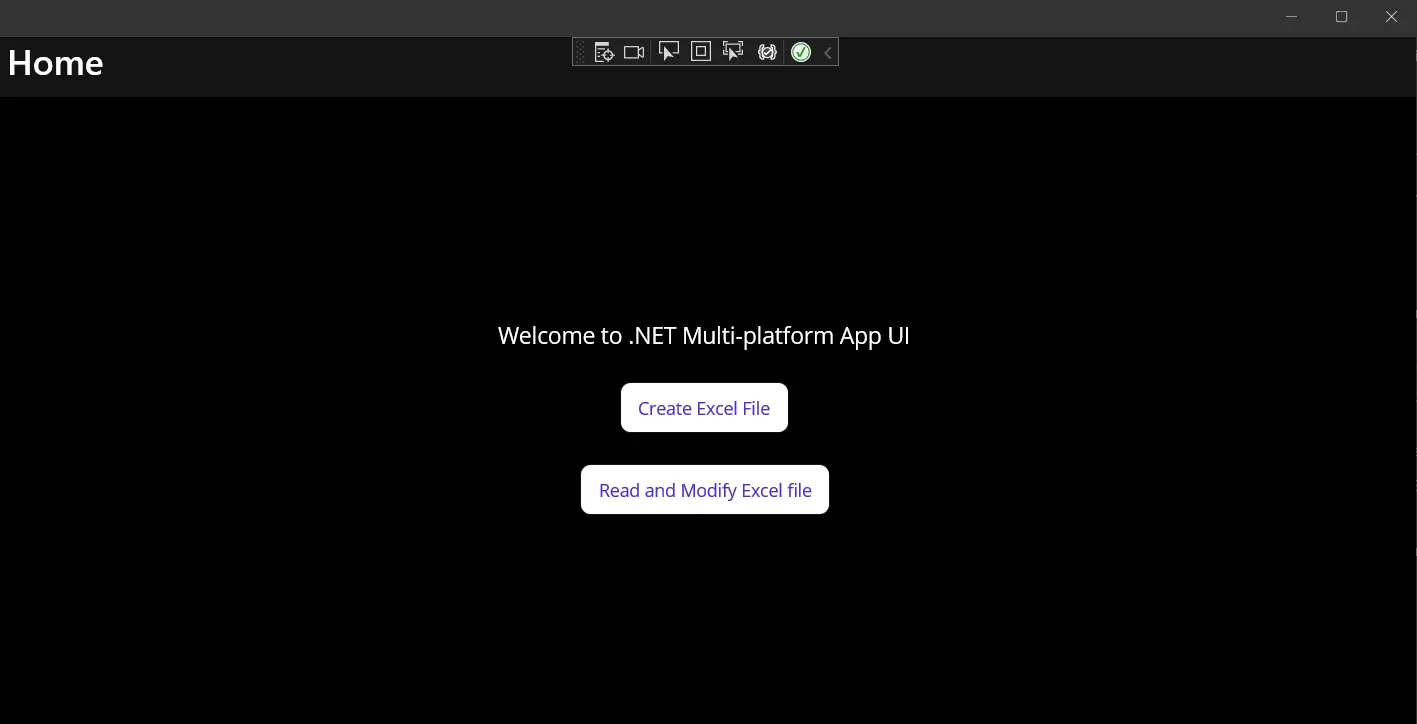
图 1 - 输出
点击“创建 Excel 文件”按钮将打开一个单独的对话框窗口。 此窗口提示用户选择位置和文件名,以保存新生成的 Excel 文件。按照指示指定位置和文件名,然后点击“确定”。 之后,另一个对话窗口将会出现。
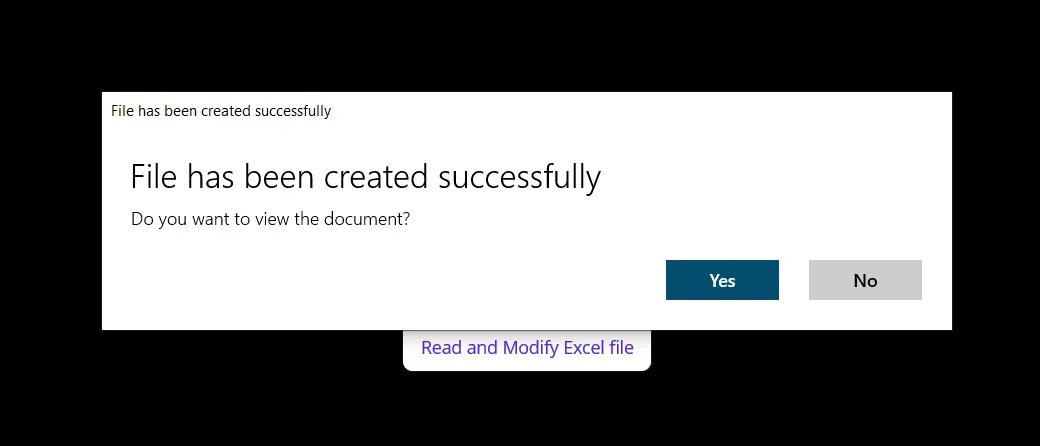
图2 - 创建Excel弹窗
按照弹出窗口中的指示打开 Excel 文件,就会出现如下截图所示的文档。
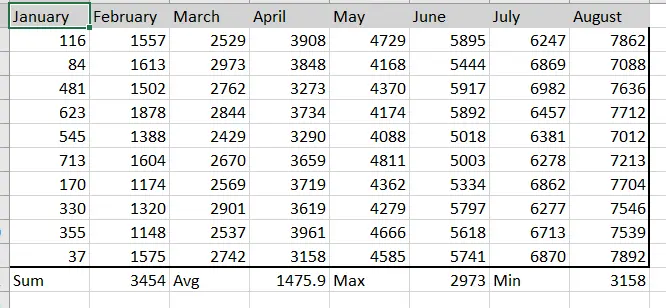
图 3 - 读取和修改 Excel 弹出窗口
单击 "读取并修改 Excel 文件 "按钮将加载先前生成的 Excel 文件,并使用我们在前一节中定义的自定义背景和文本颜色对其进行修改。
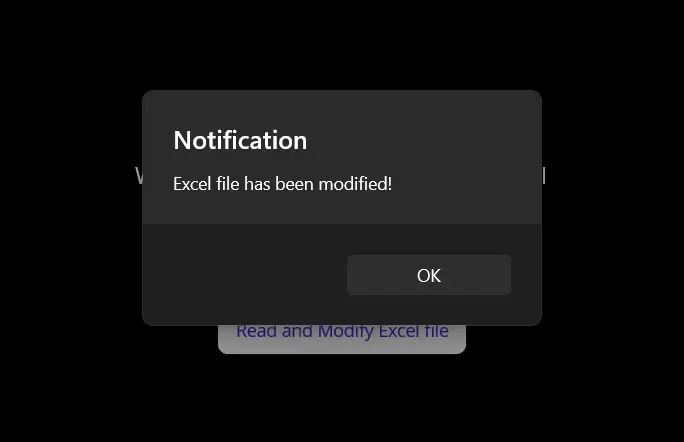
图 4 - Excel 输出
打开修改后的文件,你会看到以下输出结果和目录。
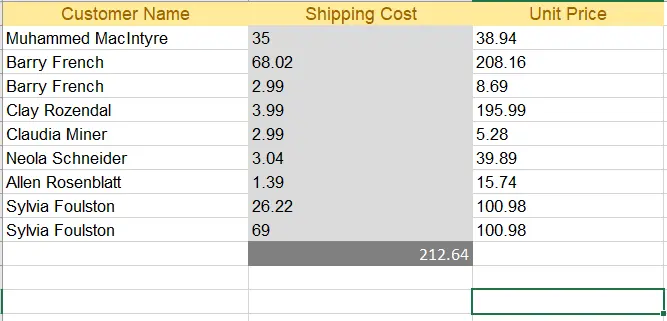
图 5 - 修改后的 Excel 输出
结论
这解释了我们如何在 .NET MAUI 应用程序中使用 IronXL 库创建、读取和修改 Excel 文件。 IronXL的性能非常出色,所有操作都迅速而精准。 IronXL是一个出色的Excel操作库。 它比Microsoft Interop好得多,因为它不需要在机器上安装Microsoft Office套件。此外,IronXL支持多种操作,如创建工作簿和工作表、处理单元格范围、格式化以及导出到各种文档类型,如CSV、TSV等等。
IronXL 支持所有项目模板,如 Windows Form、WPF、ASP.NET Core 等等。 请参考我们的教程以获取有关如何使用IronXL的更多信息:创建Excel文件 和 读取Excel文件。
快速访问链接
在 GitHub 上查看此操作指南
该项目的源代码可在 GitHub 上获取。
使用此代码,只需几分钟就能轻松上手并运行。该项目保存为 Microsoft Visual Studio 2022 项目,但兼容任何 .NET IDE。
如何在.NET MAUI应用中读取、创建和编辑Excel文件






















